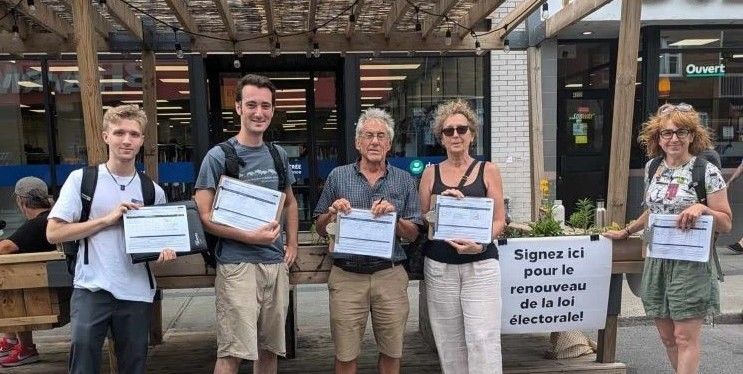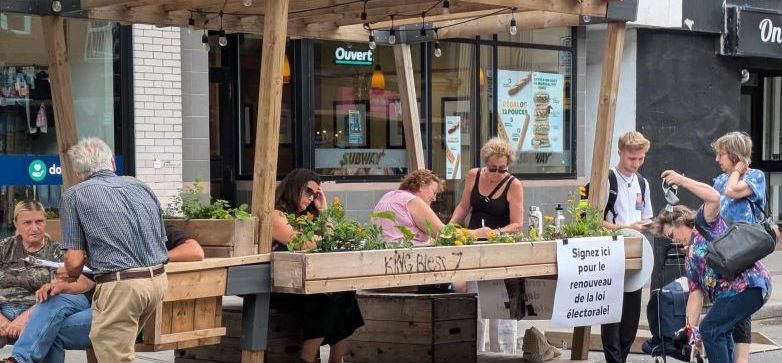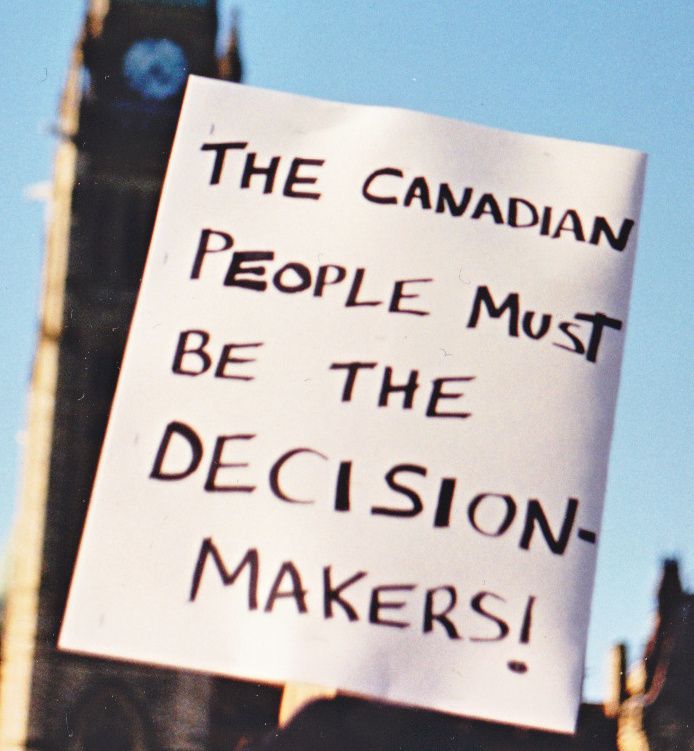August 29, 2024
LaSalle–Émard–Verdun September 16 Federal By-Election
Longest Ballot Project Surpasses Previous Achievement!

Collecting signatures in La Salle-Émard-Verdun for Longest Ballot Project candidates
At the close of nominations in the La Salle–Émard–Verdun (LEV) federal by-election to be held on September 16, 91 candidates had successfully registered their nominations, up from 84 in the Toronto–St. Paul’s by-election held on June 24 this year. It has once again broken the record for the longest ballot in Canadian history!
This is the fourth election campaign in which the Longest Ballot Project highlights the need to reform the electoral law so as to get rid of the first-past-the-post method of counting votes. It is a method which gives the seat in Parliament for the riding to the candidate with the most votes, even if the number of votes received falls far short of a majority of eligible voters. This arrangement greatly favours the established cartel parties and their aim of winning the most seats while the people’s right to an informed vote and the right to decide their own affairs is not on their agenda. The cartel parties which have massive electoral war chests, receive the most airtime on television and radio and employ advanced systems of micro-targeting through which they calculate the necessary margins of victory to prevail under the first-past-the-post system, and encourage or discourage certain sectors of electors accordingly.
Of the 109 people who sent their names to the Longest Ballot organizers to be candidates, 79 succeeded in getting through all the steps in time to get their names on the ballot. In other words, of the 91 people running in the September 16 by-election in LEV, 79 are part of the longest Ballot Project. It shows that Canadians and Quebeckers want change!
Some 13,000 signatures were gathered to nominate these candidates in the riding in two days after the writ was dropped. The e-mail sent out by Longest Ballot organizers Tomas and Kieran Szuchewycz and Sébastien Côrriveau on August 27 says, “Congratulations! We want to send our deepest thanks to all of you who helped make this year’s second record-breaking ballot possible. As of today, the total candidate count for LaSalle–Émard–Verdun is 91, which beats our previous record of 84 achieved earlier this summer in Toronto–St. Paul’s. We knew it would be tough to break the 100 candidate mark, nonetheless we hope you are as happy as we are with this extraordinary achievement.”
“[…] we are extremely proud to continue to raise the important issue of democratic reform in a unique way!,” the organizers conclude. They point out that the results show that residents of LEV were “very eager to help us send a message for democratic reform.”
The 79 candidates presenting themselves for election on the Longest Ballot Project, are all independents with the exception of three who represent the Marxist-Leninist Party of Canada, the Marijuana Party and the Rhinoceros Party.
The other twelve candidates include representatives of the five cartel parties in the House of Commons — the Liberals, Conservatives, Bloc Québécois, NDP and Green Party and three parties without seats in the House of Commons: the newly-formed Canadian Future Party, the Christian Heritage Party and the People’s Party of Canada. An additional four candidates are also standing as independents.

Federal Government’s Program for Electoral Reform
One of the reasons the people of the La Salle-Émard-Verdun (LEV) federal riding signed on to nominate candidates on the Longest Ballot in the current by-election is because they are fed up with the promises of the cartel parties to bring about electoral reform. The history of proposals for electoral reform in Canada over the past five decades basically consists of changing the way that votes are counted and translated into seats in the House of Commons. This serves to divide the polity into camps which favour one method of counting votes over another while the fundamental question of the crisis of liberal democracy itself is not even broached.
The discourse serves to glorify voting as “the most basic democratic exercise” precisely at a time when the people are saying that voting every four or five years is 1) not enough and 2) serves as a method of disempowering the people who get to cast a ballot for a candidate and an agenda they did not select and over whom they exercise no control.
The people need to focus on the problem of the party system of government itself and how it works to keep them out of power, and on how the electoral law enshrines privilege and arbitrariness, as illustrated by the methods proposed by the cartel parties for consultation and decision-making about electoral reform.
By voting for a candidate on the Longest Ballot Project citizens in LEV can express their demand to end the first-past-the-post method of counting votes which brings cartel parties to power and disempowers them completely.
Liberals’ Betrayal of Election Promises to Change the Method of Counting Votes
The Longest Ballot Committee began its Longest Ballot Project after Prime Minister Justin Trudeau failed to make good on his 2015 election promise in which he said his party was “committed to ensuring that the 2015 election will be the last federal election using first-past-the-post.” Its aim is to maintain focus on the need to abolish the first-past-the-post method of counting votes and the creation of a constituent assembly process which would enable Canadians to themselves draft and approve a new electoral law free of the self-serving interests and interference of parties with seats in the House of Commons.
 The story of how and why the Liberal Party of Justin Trudeau reneged on its promise to end the first-past-the-post system is a sordid one. In his 2015 electoral promises to end first-past-the-post, Trudeau said he would be “really open to listening to Canadians.” “I have moved in my thinking towards a greater degree of openness to what Canadians want,” he said.
The story of how and why the Liberal Party of Justin Trudeau reneged on its promise to end the first-past-the-post system is a sordid one. In his 2015 electoral promises to end first-past-the-post, Trudeau said he would be “really open to listening to Canadians.” “I have moved in my thinking towards a greater degree of openness to what Canadians want,” he said.
Once elected, he set up a House of Commons All-Party Committee on Electoral Reform. Before it deliberated, he said, “It’s not up to any one person, even the Prime Minister to define exactly what the right system is.” After it deliberated and made recommendations for a system of proportional representation he did not like, he declared, “I have been consistent and crystal clear from the beginning … I think proportional representation would be bad for our country.” Since then he has steered clear of the topic.
The Liberals came to power on October 19, 2015, forming a majority government with 6.9 million out of 25.9 million electors casting ballots in its favour. With a turnout of 68.3 per cent, this amounted to votes from slightly more than 27 per cent of the electors giving rise to a “majority.” In May 2016, they set up a House of Commons All-Party Committee on Electoral Reform to study the electoral system and make recommendations. In December 2016 the Committee recommended that the government present a form of proportional representation voting and hold a national referendum. In the interim, Trudeau was already signalling his party’s preference to do nothing or for another proposal. In October of that year, he went so far as to tell reporters that with the election of the Liberals, electoral reform might not be needed! “Under Mr. Harper,” he said, “there were so many people unhappy with the government and its approach that they were saying, ‘We need electoral reform in order to no longer have a government we don’t like.'”
At the tabling of the All Party Committee’s report in December, then Democratic Institutions Minister Maryam Monsef reiterated that first-past-the-post would be gone by the 2019 election. She was later replaced by Karina Gould who was specifically mandated to remove electoral reform from her work.
The ruling Liberals ignored both the Committee’s recommendation and the broad support it heard for an end to the first-past-the-post system. People objected to the fact that in recent years it has given rise to “majority” governments with as little as 22 per cent of eligible voter support. In 2020, a Leger poll found that in answer to the questions it posed, 76 per cent of respondents expressed various levels of support for proportional representation over first-past-the-post and 80 per cent favoured the creation of a constituent assembly for electoral reform. Furthermore, in 2017 when Prime Minister Trudeau reneged on his electoral promise to end the first-past-the-post electoral system and unilaterally went against the recommendation of the Committee, he declared that proportional representation would pose a threat to Canada by allowing “extremist” parties to win seats in the House of Commons. He implied that only those forces that join in “big tent” parties are legitimate. According to him these parties represent everyone’s opinions and interests.
The Liberal Party’s abuse of its power outdid that of previous cartel parties that have amended the Canada Elections Act to favour their own interests at the expense of the public purse and the democracy itself which is every more discredited. For their part, Canadians demand electoral reforms which strengthen the ability of Canadians to exercise control over their government.
Speaking at the time of the formation of the All-Party Committee, Trudeau declared its work “must be undertaken without any preconceived notions of what the best solution would be.” He said that the Committee would study ranked ballot and proportional representation system, along with online voting and mandatory voting.
He then consummated the betrayal of his promise to enact changes to the electoral law after the Committee’s study and report. “We had a preference to give people a ranked ballot,” he declared (emphasis added). Canadians from one end of the country to the other questioned who this “We” represented. “It was my choice to make,” Trudeau responded.

|

|


